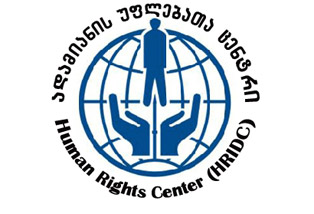Human Rights Center’s Statement about Recent Decisions of the Central Election Commission
September 13, 2013

On September 3, the Central Election Commission (CEC) refused the initiative group, which had nominated Salome Zurabishvili as a presidential candidate, to register her. Salome Zurabishvili appealed the CEC decision to the Tbilisi City Court. On September 6, the Tbilisi City Court upheld the decision of the CEC and Salome Zurabishvili has already appealed to the upper instances of the court. After all, not even the Appeal Court satisfied Zurabishvili’s appeal and upheld the CEC decision which states that Salome Zurabishvili cannot participate in the October 27 Presidential Elections as a candidate, because of her dual citizenship [Georgia, France].
The Human Rights Center thinks that constitutional provisions do not clearly regulate this issue, but if we discuss these norms in complex, the CEC refusal to register candidates with dual citizenship is an incorrect interpretation of the Constitution.
First of all, norms regulating registration of presidential candidate and occupation of the president’s position should be differentiated. In accordance with Article 291 of the Constitution of Georgia (the CEC relies on this article) “Anyone with dual citizenship cannot hold position of the President, Prime-Minister of Georgia, and Chairman of the Parliament of Georgia.” We think that this norm prohibits a citizen to occupy the position of the President of Georgia and not to be registered as a presidential candidate.
In accordance with Article 70 paragraph 2 of the Constitution of Georgia “Any person may be elected the President of Georgia if he/she is a native-born citizen of Georgia, having the right to vote, has reached the age of 35, has lived in Georgia for at least five years and lived in Georgia for three years by the day on which the election is scheduled.” This norm allows a citizen of Georgia to be elected as the President of Georgia.
Article 71 of the Constitution of Georgia distinguishes the norms of taking up president’s office and registration as a candidate, because a person officially takes up the office of President after she/he makes program speech and takes the oath (Art. 71 par. 1). Based on the aforementioned circumstances, it is clear that any citizen of Georgia, who also holds citizenship of another country and meets requirements of Article 70 of the Constitution, can participate in the elections as a presidential candidate but in accordance with Article 29 of the Constitution, she/he cannot take up President’s office without declining the foreign citizenship.
Considering the aforementioned circumstances, Human Rights Center believes that the CEC Chairman’s conclusion to refuse applicants with dual citizenship to be registered as presidential candidates contradicts the Constitution of Georgia.
It is regrettable that the Court also shared the wrong position of the CEC and did not uphold Salome Zurabishvili’s appeal.
It is noteworthy that another mistake was made by the CEC also related to the registration of a candidate with dual citizenship. Namely, two potential presidential candidates, except Salome Zurabishvili, were refused to be registered because of dual citizenships. One of them, being a citizen of Georgia and Netherlands, appealed the decision to the Court, but in vain.
In addition to that, on September 10, one more potential candidate Zurab Tsitsuashvili said that he also holds dual citizenship (Georgia-USA), but despite that, the CEC registered his initiative group and personal nominator. The CEC Spokesperson Eka Azarashvili clarified that “Zurab Tsitsuashvili has not been registered as a presidential candidate yet and only initiative group has been registered at the CEC. The documentation provided by the initiative group did not mention Tsitsuashvili’s dual citizenship but after he publicly acknowledged it, the CEC will request documentation from the corresponding agencies and will pass an adequate decision.”
Human Rights Center thinks that it is an issue of concern, when the CEC personally seeks information about dual citizenship of an applicant in one case and refuses his/her initiative group to be registered based on this motive, but in another case the CEC registers the initiative group and encourages the presidential candidate to trust the administrative body and starts collecting signatures, opens election HQs, employs people that causes serious financial expenditures. In this case, the CEC is not interested in the candidate’s dual citizenship, although Tsitsuashvili publicly declared it via mass media. Double standard of the CEC approach to candidates makes us to doubt that the refusal to Salome Zurabishvili’s initiative group to be registered might be caused by political motives.
Human Rights Center hopes the new chairperson of the CEC will timely elucidate the situation and pass decisions in compliance with the law.
Human Rights Center
News
December 13, 2023
Ethnic minorities outside the peace dialogue
November 6, 2023
‘Peace’ agenda of political parties
Popular
Articles
February 13, 2024



